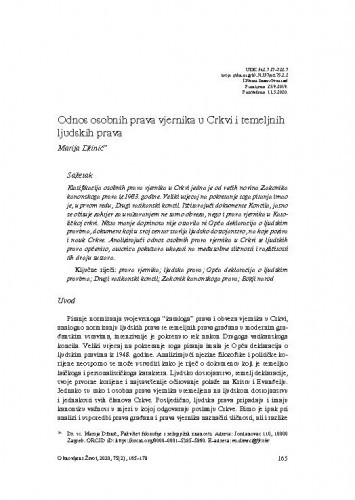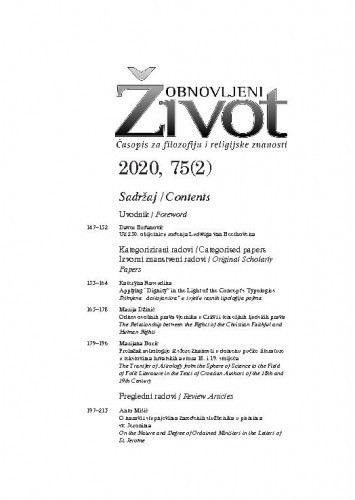Klasifikacija osobnih prava vjernika u Crkvi jedna je od većih novina Zakonika kanonskoga prava iz 1983. godine. Veliki utjecaj na pokretanje toga pitanja imao je, u prvom redu, Drugi vatikanski koncil. Iščitavajući dokumente Koncila, jasno se očituje zahtjev za uvažavanjem ne samo obveza, nego i prava vjernika u Katoličkoj crkvi. Ništa manje doprinosa nije ostavila ni Opća deklaracija o ljudskim pravima, dokument koji u svoj centar stavlja ljudsko dostojanstvo, na koje poziva i nauk Crkve. Analizirajući odnos osobnih prava vjernika u Crkvi te ljudskih prava općenito, autorica pokušava ukazati na međusobne sličnosti i različitosti tih dvaju sustava.; The regulation in the Church of the rights of the Christian faithful is one of the greatest milestones of the Code of Canon Law. The Second Vatican Council had a great effect on the raising of this issue. The documents of the Council speak very clearly about the requirement to respect, not only the obligations of the faithful in the Catholic Church, but also their rights. No less significant was the contribution of the Universal Declaration of Human Rights, a document which focuses on human dignity. The obligation to respect this same dignity is invoked also in the doctrine of the Church. On the basis of an analysis of the relationship between the rights of the Christian faithful and human rights in general, this article endeavours to explain and highlight the similarities and differences between these two systems. Despite the fact that they are grounded in natural law, the rights of the Christian faithful cannot be equated fully with fundamental human rights. Moreover, human rights are based on natural law, while the former arise from their incorporation into the community of the People of God. The Church is aware that human rights today are largely violated in the name of individual freedom. Her mission is to appeal for the respect of those rights, and she is assisted in this task by the Universal Declaration of Human Rights. It is precisely this document that is essential to the process of building a mature and healthy consciousness and morality in accordance with the dignity of each community member.
Sažetak

 Obnovljeni život : časopis za religioznu kulturu : 75, 2(2020) / glavni urednik Tadija Milikić.
Obnovljeni život : časopis za religioznu kulturu : 75, 2(2020) / glavni urednik Tadija Milikić.